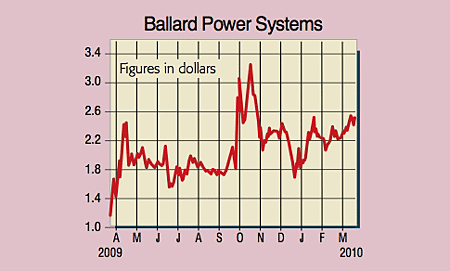
Amid all the sporting hullabaloo of the Winter Olympics, a major scientific breakthrough went largely unnoticed. The 20 pristine British Columbia Transit buses that were used to carry visitors from the ice-hockey rink in downtown Vancouver to the ski slopes of Whistler Mountain were powered by hydrogen fuel cells made by Ballard Power Systems of Canada. And not only did its fuel cells produce zero emissions, but they were also quieter and three times more efficient than normal petrol engines.
That type of publicity on the world stage is invaluable. Indeed, I think that kind of live demonstration will soon lead to a big pick up in demand for Ballard’s hydrogen-powered buses. And that uptake may be just around the corner. The board expects orders – such as those already secured from SunLine Transit Agency in California and others in Cologne, Amsterdam and London – to drive turnover 35% higher this year from $46.7m in 2009. Moreover, one of the more impressive aspects of these vehicles is that, despite being severely tested in some serious accidents, none triggered an explosion. The buses are designed so that the fuel tanks will emit a jet of flame if ruptured and ignited, rather than going off like a bomb as an internal combustion engine does.
Ballard Power Systems (Nasdaq: BLDP)
Yet transport is only part of this story. Fuel cells are also being used in ferries and fork lift trucks to recharge heavy-duty batteries and as back-up power sources within the telecommunications industry. However, given that these are still early days for this technology, the $64m question is when can the company expect to realise its true potential? My instinct is that it will take another five years before Ballard is really firing on all cylinders. But when it does, it should become a lucrative money-spinner.
For example, by 2015 I would expect the experienced management team to have increased revenues and Ebita to $300m and $50m respectively. On this basis, I would rate the company using a ten-times earnings multiple. After adjusting for the net cash of $80m, the $200m of carried forward tax losses, and discounting back at 12%, that delivers a fair value of $4.5 per share.
However, as with most game-changing inventions, the stakes are high. Being a small loss-making business, Ballard carries a greater degree of risk than it would were it larger and more diversified. It is also exposed to the usual concerns of technological obsolescence, withdrawal of subsidies, foreign exchange, cash-burn (of $20m in 2010), lumpy orders and the economy. All the same, as the world looks towards green-technology to solve the problems of global warming, this company appears to be in the right place at the right time.
Recommendation: SPECULATIVE BUY at $2.71
• Paul Hill also writes a weekly share-tipping newsletter, Precision Guided Investments